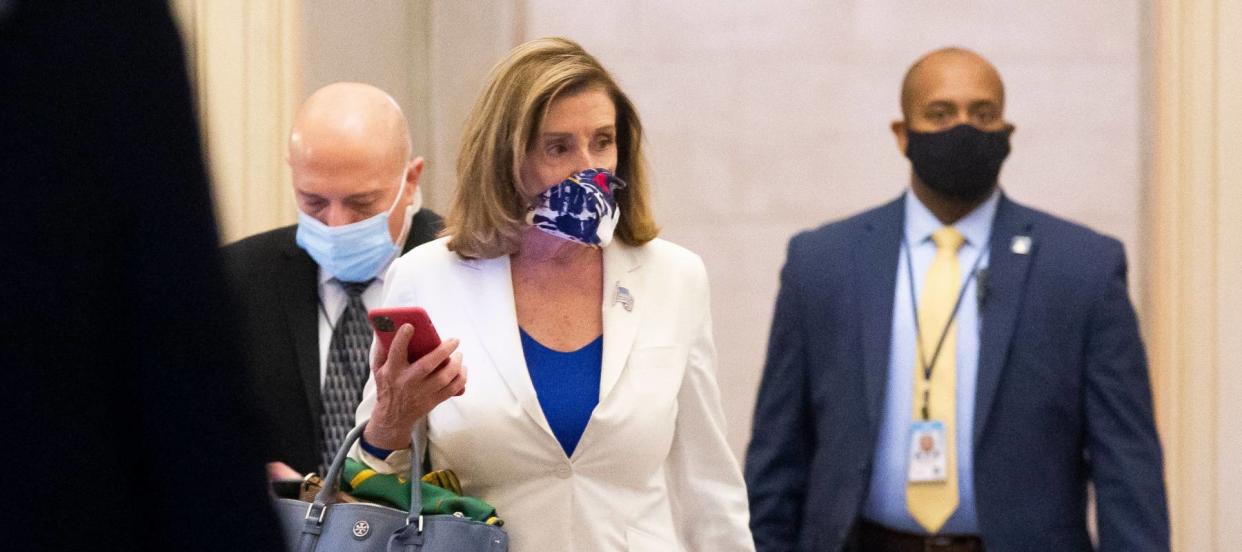Don't give up on a second stimulus check — here's the possible timing

Members of both major political parties have said they support a second round of those $1,200 coronavirus "stimulus checks" to give households a financial boost and stimulate the economy.
But after a lot of manuevering in Washington and tweeting by President Donald Trump, the checks still aren't in the mail — at least, not yet.
It was last week on Twitter that Trump said the discussions were done and the White House was walking away from the negotiating table.
But on Tuesday, he tweeted at the negotiators: "STIMULUS! Go big or go home!!!"
House Speaker Nancy Pelosi and Treasury Secretary Steve Mnuchin have been talking, and Senate Republicans are working on their own proposal. A deal doesn't seem close, but with an election coming up it's too for cash-strapped consumers to give up hope.
Here's what we currently know about when or if you'll get additional coronavirus cash from the government.
2nd stimulus checks: What's happening?

It's been more than six months since Trump signed the law that gave you your first — and so far only — stimulus check. (Which were mostly in the form of direct deposits, not check.)
The typical payment was $1,200, though the amount phased out for Americans with higher incomes. Families received $500 per child, but only up to age 16.
Households devastated by layoffs and lockdowns used the cash to buy food or pay bills. Americans in better financial shape went splurging, or used the money for more practical purposes like buying affordable life insurance to protect family members if a breadwinner died from the virus.
At the start of October, the Democratic-controlled U.S. House approved a new $2.2 trillion bill offering $1,200 for most taxpayers plus $500 per dependent. But the House needs to make a deal with the Republicans in charge of the Senate and the White House.
Following his recent hospitalization for COVID-19, the president tweeted that Speaker Pelosi was "not negotiating in good faith" and said he had instructed his side to stop bargaining until after the Nov. 3 election.
But since late last week, Trump has been playing cheerleader for a major relief package.
How soon could you get more stimulus money?
With unemployment still high and with cooler weather bringing predictions of new infection spikes and new lockdowns, many consumers have been hoping for another $1,200.
On behalf of the White House, Secretary Mnuchin is now proposing that new direct payments be part of a $1.8 trillion aid measure — $400 billion smaller than the House bill.
Pelosi has dismissed the offer as "insufficient," and "one step forward, two steps back." Meanwhile, Senate Republicans think the White House package is too big and are scheduling a vote for next week on a stripped-down plan — with no stimulus checks.
No one gets any money until negotiators can agree on a bill that would pass the House and Senate, then be signed by the president.
Senate Majority Leader Mitch McConnell says all of that coming together is "unlikely in the next three weeks."
Once legislation is passed, money could flow relatively quickly because the government has already been through the drill once this year.
If McConnell is wrong and a deal on direct aid money can be reached this month, before Election Day, the extra cash could start finding its way into Americans pockets in November.
If new COVID relief for Americans has to wait until after the election, it's unlikely new stimulus checks would go out before December.
What do you do in the meantime?

If your budget is stretched to the limits and you could really use an extra $1,200 right now, here are a few ways to find that cash on your own — and stop waiting for Washington to get its act together.
Cut the cost of your debt. If you're carrying high-interest credit cards, gather up those balances into a debt consolidation loan at a lower interest rate. You'll make that debt less expensive and replace multiple monthly payments with just one.
Trim your insurance costs. Car insurance companies have been lowering their rates amid the pandemic, but if yours won't cut you a break start shopping around for a better one. And when your homeowners insurance comes due, seek rate quotes from competing insurers and compare them, to get the best deal on coverage.
Refinance your mortgage. If you've got a mortgage and haven't refinanced yet in 2020, you're overdue. Thanks to some of the lowest mortgage rates on record, more than 19 million homeowners have the potential to reduce their monthly payments by around $300 through a refi, says data firm Black Knight.
Clamp down on your monthly spending. Consider dropping your cable and using a less expensive streaming service instead. Fight the temptation to order delivery for dinner and make meals in your own kitchen. And, download a free browser extension that will find you the best price every time you shop online.
Pick up a side hustle. Make some extra money by getting yourself a side gig. Turn a hobby into a source of income, or use an online marketplace to find someone eager to pay for your talents and skills.

